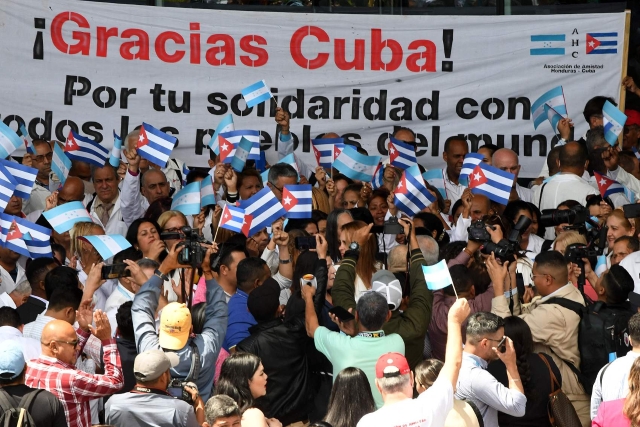
Cuban doctors receive a warm welcome upon their arrival at Palmerola International Airport in Tegucigalpa, Honduras, on February 27, 2024. (Photo: CFP)
The U.S. has recently imposed visa restrictions on Cuban government officials and individuals worldwide allegedly "complicit" in Cuba's overseas medical aid programs, citing concerns over "forced labor."
On February 25, U.S. Secretary of State Marco Rubio, who is of Cuban descent, formally announced the measures, prompting swift condemnation from Caribbean leaders. Many have expressed a willingness to forgo U.S. visas in solidarity with Cuba's medical brigades, arguing that Washington is once again unfairly targeting Havana's global healthcare efforts.
But is Washington's concern over "forced labor" genuine, or is this another geopolitical maneuver?
Cuban medical missions: A balance of humanitarianism and economic strategy
Cuba remains one of the few nations offering universal free healthcare, with a state-led model for deploying its medical workforce both domestically and internationally.
The country's medical missions operate in three primary ways. First, they provide emergency aid in crises, such as the 1985 Mexico City earthquake, the 2010 Haiti cholera outbreak, and the Ebola crisis in West Africa. During the COVID-19 pandemic, Cuban doctors were dispatched to Italy to assist overwhelmed hospitals.
Second, Cuba collaborates with third-party nations—including Norway and, in some cases, even the United States—to coordinate humanitarian medical relief. Beyond direct interventions, Cuba also runs the Latin American School of Medicine (ELAM), offering free medical education to over 35,000 graduates from 141 countries.
The third and most debated aspect of Cuba's medical programs is the export of medical services as a revenue source. More than 4,000 Cuban healthcare professionals currently serve in 32 African nations, addressing critical public health challenges such as malaria and tuberculosis. Agreements with host countries vary: some are purely humanitarian, others involve cost-sharing models, and some are funded through international organizations or trade arrangements, such as the "oil-for-doctors" program with Venezuela.
Critics argue that the Cuban government exploits medical personnel by controlling their wages. However, Cuban health workers sign contracts outlining their work conditions and compensation, and they participate voluntarily. Helen Yaffe, a lecturer in economic and social history at the University of Glasgow, noted that these professionals receive standard Cuban wages along with additional compensation from host nations, with guarantees for vacations and family contact.
This model is not dissimilar to how other nations manage state-employed professionals abroad. If Cuba's approach is labeled "forced labor," then international organizations such as Médecins Sans Frontières (Doctors Without Borders) and the Orbis Flying Eye Hospital could arguably face similar scrutiny.
A long-standing target of U.S. policy
Cuba's medical missions have long been in Washington's crosshairs.
In 2006, the Bush administration introduced the Cuban Medical Parole Program, offering visas to defecting doctors—though few took up the offer. The program was discontinued in 2017, but in 2019, the Trump administration designated Cuba as Tier 3 in its annual Trafficking in Persons (TIP) Report, citing medical deployments. That same year, the U.S. Agency for International Development (USAID) funded efforts to discredit Cuba's healthcare initiatives.
Former U.S. diplomat Vicki Huddleston, who once headed the U.S. Interests Section in Havana, dismissed the allegations as political theater.
"Cuba has eradicated the coronavirus at home and provided succor to others, while the Trump administration has failed to staunch the pandemic at home and abandoned its leadership abroad," she said when Marco Rubio proposed the measure in 2020.
"It is a ploy to garner conservative Cuban-American votes and resources and to deny revenues to the Cuban government by using the false rationale that Cuban doctors are being trafficked," Huddleston noted.
Co-presented by GDToday and the School of Journalism and Communication, Jinan University
Reporter | Liu Xiaodi, Wang Tianyu (intern)
Editor | Yuan Zixiang, James, Shen He

















